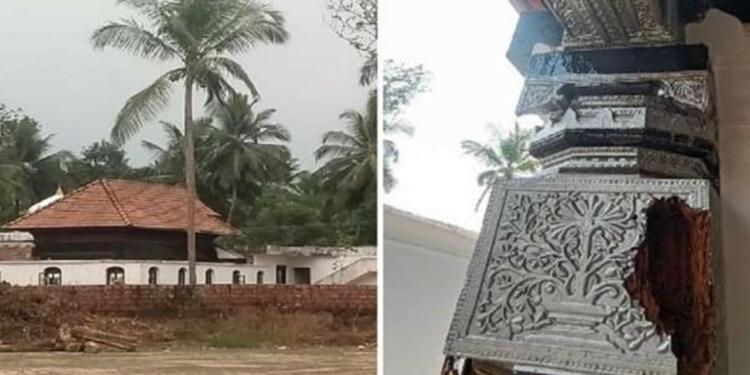- During the renovation of a Masjid in Mangalore, authorities discovered the remains of an existing Mandir beneath the structure
- Places of Worship (Special Provisions) Act, 1991 is a big roadblock in the revival of Mandirs buried under Masjids
- Either the Places of Worship Act needs to go away or the Hindus should be provided alternate land for the revival of these Mandirs
Once again, the country is pondering about the buried legacy of Hindus in the country. Once again, it is the Masjids that are at the centre of the debate. The question is, for how long will Hindus have to watch the destruction of their places of worship getting official recognition.
Mandir structure discovered inside of Masjid
Recently, a Masjid was being renovated in Mangalore, Karnataka. The Masjid is a Juma Masjid (a Masjid where Muslims mainly gather on Fridays to offer their prayers) in the outskirts of Mangaluru. When the Majid authorities were conducting their official duties, they found a Hindu Mandir-like architectural design under that Masjid.
As soon as news of the new findings started to make rounds, pro-Hindu groups demanded to stop the renovation till the verification of the discovered structure was conducted by authorities. Dakshina Kannada Commissionerate obliged to the request and has decided to pause the renovation.
Rajendra KV, Deputy Commissioner, Dakshina Kannada, said, “I have received information from field officials and police department about the issue. The District administration is looking into the old land records and entries regarding the ownership details. We will take reports both from the endowment department and the Waqf Board.”
Places of Worship Act is a roadblock
Even if it is found that there existed a Mandir beneath the Masjid, it will not be possible for Hindu Samaj to re-establish the Mandir in place of the existing structure. This is because, under the existing legal remedies, Masjid authorities have full authority to escape any scrutiny about the historical underpinnings of the existing structures.
The decision on whether a Masjid can be broken to reinstate the existing Mandir is guided by the Places of Worship (Special Provisions) Act, 1991. It was passed in the year 1991 by the Narsimha Rao government. The wordings of the act effectively claim that India’s religious history is relevant only if it is traced back only to 1947.
Act is anti-Truth
The Act states that the government of the day has a duty to protect the structure of religious places. Section 3 and 4 of the act say that it is illegal to convert a place of worship of one religion into a place of worship of another religion. So, if you find historical evidence of Mandirs being broken to make way for Masjids, even then you have no right to change or break the structure of existing Masjid or convert them into Mandirs. Because apparently, at the time of India’s political independence, this place was called Masjid in official records maintained by Britishers.
Moreover, it also imposes an obligation on the government of the day to maintain the religious character. So, even if Hindus go to Court for removing the Masjid, the government which is majorly voted to power by Hindus will have to take a stand against its own constituencies.
Read more: Places of Worship Act needs to go and the push needs to come from the government
Solution to the problem
Subramanian Swamy had once informed the nation that a total of 40,000 Mandirs were demolished by invaders. However, if an effort towards reinstating all these Mandirs has to take place, then there are only two ways forward.
- Repeal Places of Worship Act, 1991. It will open the gates for free and fair enquiry about the truth. Until a legal constraint is there on the exposure of truth, communities are not going to come to a discussion table. Even if it is decided that Mandirs will be restored, then Muslims have to be allotted another piece of land by governments for conducting their own prayers.
- Another solution is providing land to Hindus in areas where it is discovered that Mandirs had been razed. This will ensure that Masjids are not harmed in the process and Hindus will also get their due share of the place of worship.
The renaissance of Indic civilisation will be incomplete without Hindus getting their deserved share in religious matters of the state. For this, the laws and conventions which effectively throttle Hindus’ rights need to be done away with. Bhagwan exists everywhere, but their Bhakts being fallible need a special place to talk to them.

























